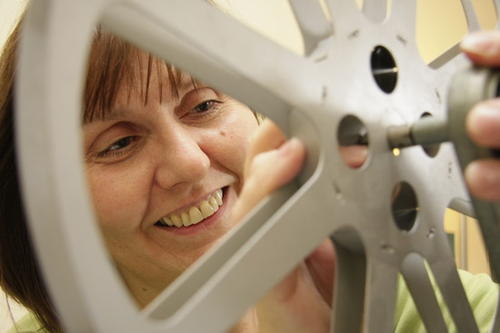Rudi Dutschke, Cookie Stealing, and Warthogs
The University Archive of Freie Universität Collects History
Jul 30, 2010
Old projectors and tape recorders with collector’s value are needed for archivist Irene Jentzsch’s work.
Image Credit: Sabrina Wendling
6,500 running meters of files, 30,000 photographs, 2,500 posters, and 1,000 audiotapes: The University Archive of Freie Universität is among the largest of its kind in Germany. It houses documents left by the estates of professors alongside historical materials from the period immediately following the founding of Freie Universität to the present day.
“This is my museum,” Irene Jentzsch says as she opens her office door. She gestures to a shelving unit holding a varied collection of old media players. Right behind the door there is a sewing machine – or rather, something that looks like a sewing machine, judging by its size and the number of spools it has. “That’s a 16-millimeter film projector,” explains Jentzsch, the archive’s audiovisual media specialist.
The machine is a gift from the private collection of a musician at the Collegium Musicum of Freie Universität. It weighs in at a hefty 25 kilograms, hardly comparable to a video recorder or DVD player. A model from the 1950s, the machine still works perfectly. Other pieces of equipment used to play back audiotapes of various widths and playback speeds sit on the shelves. Jentzsch’s modest collection of vintage machines helps her analyze audiotapes from the 1940s and 1950s as well as more recent types and have them digitized if they merit inclusion in the archive.
The archive employee’s desk is home to a miscellaneous jumble: From time to time, a grunt can even be heard coming from Jentzsch’s office. Her colleagues at the archive don’t wonder about it because they know it’s just the warthogs mating again – on the screen, that is. The University Archive’s collection includes films by the animal documentarian and Freie Universität alumnus Reinhard Radke, including one entitled The Love Life of the Warthog (Das Liebesleben des Warzenschweins).
“Audiotapes Serve as Contemporary Witness Accounts”
The oldest films in the collection date to the period immediately following the foundation of Freie Universität: One film, from 1949, documents day-to-day student life, and another, from 1954, records the opening of the Henry Ford Building. To Jentzsch, some of the most exciting pieces of contemporary documentation are the audio recordings from the years of upheaval surrounding the student movement: Muffled applause is heard. “Dutschke,” someone mumbles into the microphone, announcing the next speaker.
Then, in a clear and determined voice and with a slight lisp, Rudi Dutschke, a famous figure in the German student movement, begins to speak of a student assembly on the topic of international counterrevolution on October 20, 1967. The background behind the event is the protests against the Vietnam War. Listening to the old tapes brings a smile to Jentzsch’s face sometimes, “like when a protest starts off with the proud announcement that the cookies have been stolen from the rector’s stash.”
But even if some documents may seem somewhat idiosyncratic, “the films and audio recordings are important, especially since they are often the only source, if there is no written copy of a speech,” Jentzsch says. “These documents serve as contemporary witness accounts.”
The University Archive is, incidentally, not only a place to “unload” documents, or a point of contact for research: The archivists are also happy to help those affiliated with Freie Universität systematically organize documents or preserve and restore materials after fire or water damage.
Written by Sabrina Wendling
Further Information
Dr. Birgit Rehse, Director
University Archive
Boltzmannstr. 20, 14195 Berlin
Telephone: +49 (0)30 838 532 37
Telefax: +49 (0)30 838 534 99
Email: archiv@fu-berlin.de

